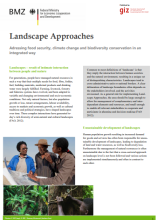Land Library
Welcome to the Land Portal Library. Explore our vast collection of open-access resources (over 74,000) including reports, journal articles, research papers, peer-reviewed publications, legal documents, videos and much more.
/ library resources
Showing items 1 through 9 of 119.Water- and land-related resource conflicts are the starting point of the Zambian nexus study. Zambia is endowed with abundant land and water resources, the utilisation of which offers huge potential for the country’s economic development.
Financing forest restoration with the private sector – Does it work?
Irrigation can help to improve and stabilise agricultural productivity, thereby contributing to food security and to resilience against climate change.
Recognition and respect for tenure rights has long been recognized as an important concern for development, conservation, and natural resource governance.
This article seeks to investigate whether concern for food security and investment liberalization are the principle drivers of land-grabbing in Africa.
Sub-Saharan Africa has always been perceived as a land-abundant continent. Deininger & Byerlee (2011) estimate that the continent has the largest area of potentially available uncultivated land.
In the paper land reform in South African political discourse will be investigated, especially the process of its politicization. How the topic of land reform is used by political forces, especially the ruling party; the African National Congress and current President Jacob Zuma.
This article aims to explore the causes of informal settlements in Ekurhuleni Metropolitan Municipality (EMM).
In the recent explosion of attention given to the land grabbing phenomenon, contract farming has been identified as a potentially inclusive alternative for smallholders to outright acquisition of farm land by agri-business capital.








